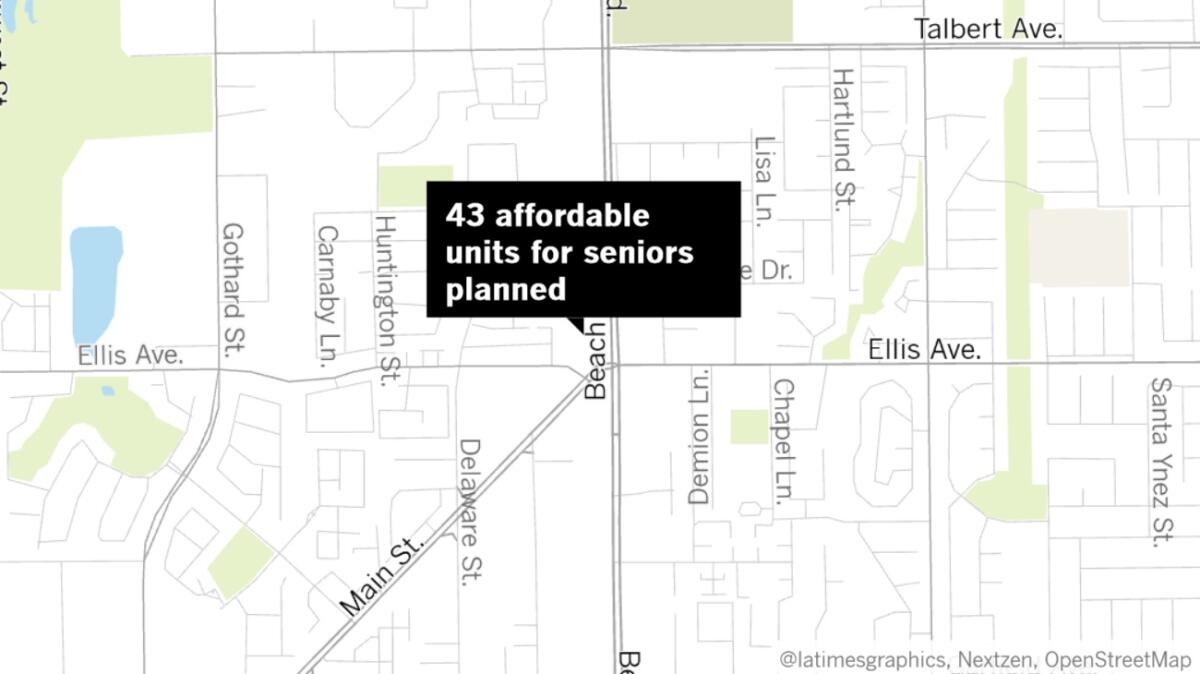H.B. council approves $3-million loan to nonprofit housing developer

- Share via
A nonprofit affordable-housing developer was approved Monday for a $3-million loan from Huntington Beach to buy property on Beach Boulevard for a prospective 43-unit supportive housing development.
The Huntington Beach City Council voted 6-0, with Mayor Erik Peterson absent, to authorize the loan agreement with Irvine-based Jamboree Housing Corp. to purchase nearly an acre at 18431 Beach Blvd. According to a July appraisal, the L-shaped vacant lot has an estimated value of $3.2 million.
Jamboree, which operates five affordable-housing projects in the city, is eyeing the site for a project that would include up to 39 one-bedroom units and four two-bedroom units with supportive services for low- and extremely low-income senior citizens. Supportive housing combines affordable housing with social services.
A condition of the loan is that if Jamboree does not secure adequate funding to build the project, the land will go to the city and be designated for future affordable housing.
Though several speakers voiced support for the prospective development, city Director of Community Development Ursula Luna-Reynosa offered a reminder that “tonight’s decision is not about the project, it’s about this acquisition loan agreement.”
Councilman Patrick Brenden said Jamboree Housing “are just quality operators. They are really top-notch.”
“We have seniors in our community that have unfortunately fallen on hard times” Brenden said. “We need projects like this to help care for our senior population.”
Councilwoman Barbara Delgleize described Jamboree as “a good partner and good developer.”
Delgleize emphasized the need for targeted supportive housing to meet the needs of an aging population.
“One of the things I like about ... this is that if for some reason this does go sideways, we own the land,” Delgleize said.
The 3% interest loan is a “forgivable loan,” City Manager Oliver Chi said. “If they maintain the covenanted period of 55 years, then the loan is forgiven,” he said.
Once Jamboree obtains construction financing, an affordable-housing agreement will go before the council, Luna-Reynosa said. If Jamboree doesn’t use the entire amount of the loan, the city may get a portion back, she said.
Housing plan amendments
The City Council also voted Monday to direct staff to prepare an updated housing plan for the state to consider for certification.
The council voted 4-2, with members Lyn Semeta and Jill Hardy objecting, to prepare amendments to the housing portions of the city general plan and Beach and Edinger Corridors Specific Plan in order to apply for state funds to establish a homeless shelter.
The amendments would go to the council before being submitted for certification by the California Department of Housing and Community Development.
To be eligible for the funds, the city must have a certified general plan housing element. Huntington Beach has missed out on up to $625,000 in available funds for affordable housing this year. Going forward, Huntington Beach would be eligible for $481,000 per year from funds made available by the state Building Homes and Jobs Act of 2017, also known as Senate Bill 2.
“This motion tonight doesn’t require us to build anything. This is a planning exercise ... that may or may not result in development,” Councilman Mike Posey said.
The current 2013-21 housing element was certified in October 2013, then decertified following city amendments to the Beach and Edinger plan in May 2015. The amendments reduced the cap on new residential development from 4,500 units to 2,100 and imposed stricter height and setback requirements after many residents complained about the high rate at which high-density residential projects were popping up.
The amendments meant the city no longer had enough land zoned to accommodate low-income residents under state requirements.
In January, California sued Huntington Beach over what state officials called the city’s failure to allow enough homebuilding to accommodate a growing population. The case is continuing after a Los Angeles County Superior Court judge in August denied the city’s request to dismiss the lawsuit.
Last week, a nonprofit organization sued the city, claiming it improperly rejected a 48-unit residential project planned for Ellis Avenue that would have included five units designated as affordable.
According to a recent Regional Housing Needs Assessment, Huntington Beach needs 3,625 new housing units. About 44% should be designated for low-income and very low-income residents, about 17% for moderate incomes and about 39% for above moderate incomes, according to the data.
Resident Cari Swan opposed amending the plans.
“To not fight against everything that SB2 represents is a flat-out betrayal to our community,” Swan said. “And for what? To be held hostage by the state the next time they want to extort or screw over our entire quality of life?”
Semeta, the mayor pro tem, echoed such concerns.
“The situation our city finds itself in is result of the state’s overreaching policies,” Semeta said. “We are the fourth-best housing producer in the county. … It’s ironic that we were targeted for a lawsuit when we’ve produced all these units.”
City Attorney Michael Gates said last week that the city has granted permits and zoning to 3,000 new housing units since 2013, “far more than any of our neighbors in the region.”
Of the 3,000 new units, 900 were for affordable housing, he said.
Posey, however, said: “To say we’ve been treated unfairly, unjustly is not true. … We voted to ratify that [Regional Housing Needs Assessment] number.”
The council’s vote triggered a 60-day public review process.
All the latest on Orange County from Orange County.
Get our free TimesOC newsletter.
You may occasionally receive promotional content from the Daily Pilot.




